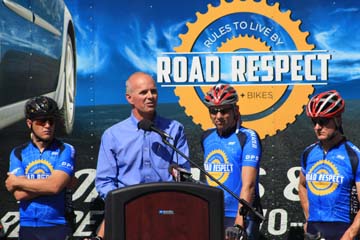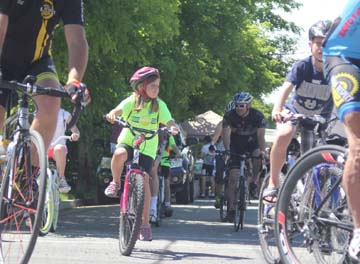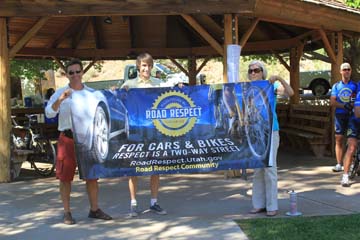The Utah Department of Transportation (UDOT) is building support for bicycling programs across the state through a grass-roots program to help communities with bicycle planning and promoting active transportation.
The Road Respect Community program provides local governments with guidance in planning and developing their bicycle programs and infrastructure. The program also provides recognition, allowing localities to earn the “Road Respect Community” title for their efforts to encourage active transportation.
The program is an offshoot of the Road Respect bike safety education campaign, launched in 2011 by UDOT in collaboration with the Utah Department of Public Safety (DPS), Zero Fatalities and Bike Utah. The goal of the campaign is to educate both cyclists and drivers about state safety laws and encourage mutual respect on the road.

UDOT Executive Director Carlos Braceras Speaks at Road Respect Event (Photo: UDOT)
The centerpiece of the Road Respect campaign has been an annual, statewide cycling tour to teach cyclists proper road etiquette and educate drivers on sharing the road. The Road Respect Tour – which is led by representatives from UDOT, DPS, health agencies, law enforcement and cycling advocates – also holds community events along the route to promote safe cycling.
The ongoing success and popularity of the campaign led UDOT to develop the Road Respect Community program to work directly with communities to help them improve their active transportation options.
“The Road Respect Community Program is a big asset to UDOT because it offers Utah’s cities and towns opportunities to expand their bicycle and active transportation programs based on the needs and desires of the community,” according to UDOT Executive Director Carlos Braceras. “Because the program reaches people on the grassroots level, it encourages communities to ‘own’ their planning process, while opening avenues of communication between UDOT, local municipalities, and active transportation advocates across the state,” he said.
“What we found as we went from community to community on the tour is they were very interested in promoting bicycling and growing their bicycling programs, but they needed a little bit of guidance on doing that,” said Evelyn Tuddenham, Bike-Pedestrian Coordinator at UDOT.
Comprehensive Approach
UDOT sought to design a comprehensive program to help communities advance their bicycle planning programs. To do so, the department developed a set of criteria based on League of American Bicyclists requirements for Bicycle Friendly Communities and other bicycle planning criteria. These criteria were used to develop checklists of actions communities can take to earn the title, “Road Respect Community,” Tuddenham said.
The program features three Road Respect Community Levels – Activate, Ascend and Peak – with corresponding requirements leading up to applying for League of American Bicyclists’ Bicycle Friendly Community status. Requirements include:
Level 1 – Activate
- Identify a community champion for bicycle planning efforts
- Identify the health, community and economic benefits of a bicycle plan and set up initial evaluation criteria including health impact assessment guidelines
- Start an inventory of bike infrastructure and identify connectivity gaps
- Develop a kid’s bicycle safety program
- Collaborate with local law enforcement to incorporate bike safety and enforcement
Level 2 – Ascend
- Involve bike advocacy groups/individuals in planning efforts
- Initiate “share the road” dialogue between drivers and cyclists
- Develop the bicycle plan by identifying potential solutions
- Roll out a local law enforcement bicycle safety and enforcement program
- Evaluate the plan under development with the criteria identified in Level 1 and including health impact assessment
Level 3 – Peak
- Adopt the bicycle plan and begin its implementation
- Work with businesses to determine and promote the economic benefits of bicycling and plan for bicycle amenities
- Develop and conduct bicycle safety campaign promoting respect between drivers and bicyclists on the road
- Evaluate the bicycle plan
- Apply for League of American Bicyclists’ Bicycle Friendly Community Status
As of May 2015, 12 cities or counties around the state had been designated as Road Respect Communities. Eight more cities and counties are slated to join in 2015, and at least seven more are in line to come onboard in 2016.

Kids and adults ride out together for a family ride, part of a Road Respect Event marking Logan, Utah’s induction as a Road Respect Community. (Photo: UDOT)
Consultation and Recognition
After a community has applied, UDOT conducts a forum to address local issues and generate potential solutions. The forum brings together representatives from UDOT, planning and law enforcement agencies, cycling advocates and other stakeholders to discuss the needs of the roadway and how they can work together to improve conditions for bicyclists. The forums have been very successful in getting issues out on the table and coming up with preliminary plans for communities to move forward, Tuddenham said.
For example, UDOT conducted a forum to help the city of Moab find bicycle-friendly solutions for its Main Street, a heavily used corridor serving business, trucking and travel. The community and cycling groups were looking for ways to help cyclists safely use Main Street to access the trails at the nearby Arches and Canyonlands national parks. The forum helped educate local stakeholders about their options on the multi-use corridor, and together with UDOT they came up with a plan for mapping and signs. Moab has since earned recognition as a Level 2 Road Respect Community.
The Road Respect Community program also offers promotional opportunities to highlight communities’ commitment to developing active transportation solutions. UDOT produces a Road Respect Community newsletter with resources including information about grants and funding, Tuddenham said. UDOT also has developed an interactive map on its website highlighting the Road Respect communities, including links to local information on bicycling and tourism.
Communities that participate in the program also are encouraged to apply for League of American Bicyclists’ Bicycle Friendly Community recognition. When they complete all the Road Respect requirements “they are perfectly positioned to do that,” according to Tuddenham.

Springdale, Utah, a gateway community to Zion National Park, becomes a Road Respect Community. (Photo: UDOT)
Collaborative Approach
The program offers a model of a collaborative approach to building an integrated transportation system, according to Tuddenham.
The program has been very successful in bringing together state agencies that may not be involved in infrastructure but are involved in promoting active transportation, Tuddenham said. For instance, UDOT has worked closely with the Utah Department of Health. The health agency has offered $3,000 grants under its Cancer Control Program to help prospective Road Respect communities get started with their bicycle planning.
The program also improves communication between communities and UDOT regarding active transportation, Tuddenham said. When working with a Road Respect Community, members of UDOT and its regional offices “know they are dealing with a community that has an understanding of what it takes to install infrastructure and what it takes to work with UDOT as an agency,” Tuddenham said.
In addition, the program has helped channel the enthusiasm of cycling advocates, Tuddenham said. In 2015, the League of American Bicyclists ranked Utah fifth among the states in bicycle friendliness, the state’s highest ranking ever.
“In a short period of time we’ve made some really impressive and very strategic advances [for bicycling] in Utah, and I think a lot of that has been because of the collaborative approach that’s come about through this program,” Tuddenham said.
Transferability and Lessons Learned
The program is very transferable to other state DOTs, according to Tuddenham. However, she emphasized that in the beginning “you have to have a hook, you have to have something that really sparks people’s imagination to get them to come on board,” Tuddenham said. For Utah it was the Road Respect Tour, but for other states it might be something different, she said.
Tuddenham also stressed the role of agency leadership. “It’s a very grass-roots program, and that’s the strength of it…people want to be involved because they see it make a difference on their level,” she said. It is important that those at the top of the organization understand and are supportive of what’s going on at the community level, she said.
In Utah, the program has benefited from the support of UDOT Executive Director Braceras, an avid cyclist himself who has participated in numerous Road Respect events. Braceras has been a big supporter of the agency’s commitment to active transportation.
For more information, link to the UDOT Road Respect webpage, or contact Evelyn Tuddenham, UDOT Bicycle-Pedestrian Coordinator at [email protected].